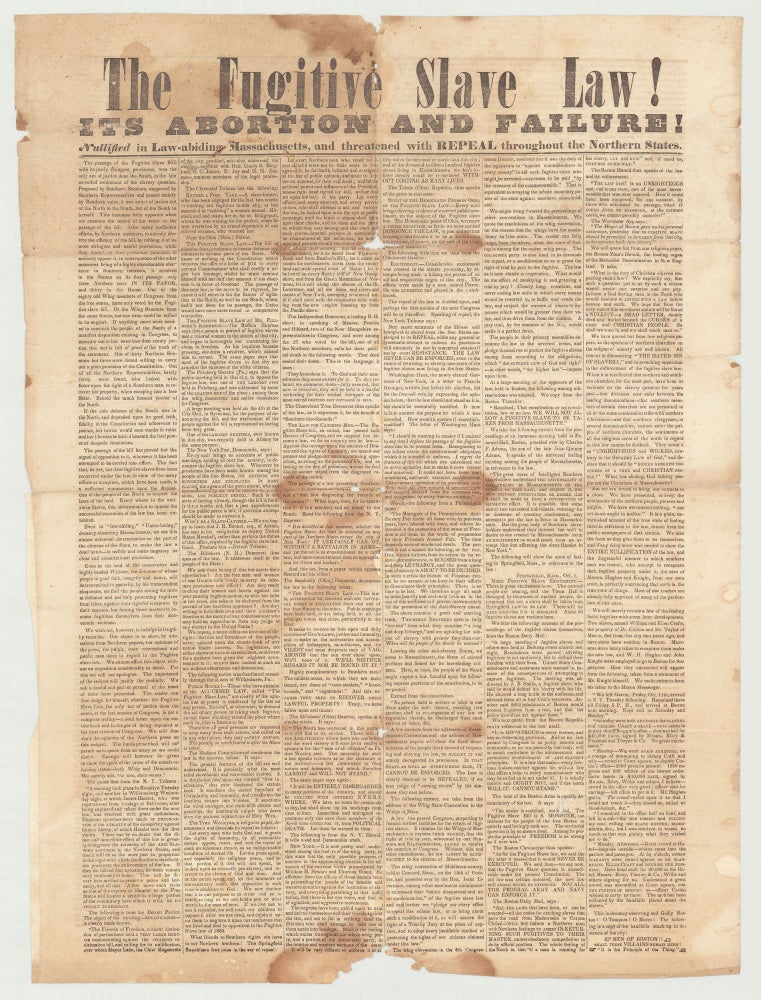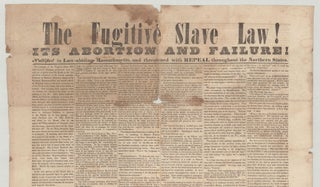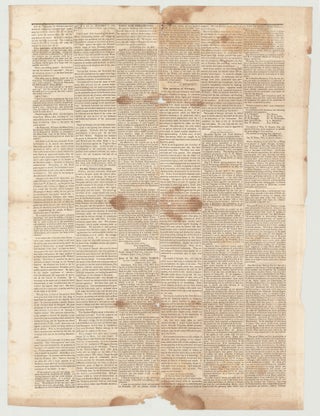Fugitive Slave Law! Its Abortion and Failure! Nullified in Law-abiding Massachusetts, and threatened with REPEAL throughout the Northern States.
[Augusta, Georgia: The Augusta Republic, 1850?]. Broadsheet, 21.75” x 16”; title above text in six columns on recto, text in six columns on verso. A remarkable, unrecorded broadsheet published in Georgia, likely in 1850, consisting of editorial commentary incorporating over forty excerpts from Northern sources exemplifying widespread, ‘unlawful’ Northern resistance to the Fugitive Slave Law. The broadsheet bears no imprint but based on external evidence we tentatively attribute it to the Augusta, Georgia Republic (the only other trace of this text that we have been able to find is a portion of the first, introductory column which appeared in The National Anti-Slavery Standard for 12 December 1850 with a note indicating that the passage was derived from the Republic). Edited by James M. Smythe—a Georgia native and graduate of the University of Georgia—the Republic was a pro-slavery, Whig publication on the extremist fringe at the time as one of only two Whig papers in Georgia that refused to support the anti-seccession Constitutional Union Party. The author begins:
The passage of the Fugitive Slave Bill, with its justly stringent provisions, was the only act of justice done the South, in the late so-called settlement of the slavery question. Proposed by Southern Senators, supported by Southern Representatives and passed mainly by Southern votes, it was an act of justice not of the North to the South, but of the South to herself.
He aims “to show, by quotations from Northern papers, the opinions of the press, the pulpit, state conventions and public men there in regard to the Fugitive slave law.” Evidence of the North’s disrespect of the “laws of the land” is demonstrated by the fact that “as yet, but three fugitive slaves have been recovered under the law.” Recounting the voting in Congress when the law passed in September 1850, he observes:
Out of thirty Northern Senators but three were found willing to carry out a plain provision of the Constitution. Out of all the Northern Representatives, barely thirty were found, who looked with favor upon the right of the Southern man to recover his property, when escaping into a free state. Behold the much boasted justice of the North … If the sole defence of the South was in the North, and depended upon its good faith, fidelity to the Constitution and adherence to justice, her towns would soon smoke in ruins and her liberties be buried beneath the fatal power of despotic fanaticism.
The extracts begin at the bottom of the first column, comprising some forty-one examples, including notices, sheets, newspaper articles, addresses at conventions, “handbills stuck up on the streets,” letters, etc. These are presented as evidence of northern resistance to—and de facto nullification of—the Fugitive Slave Law. Sources include, for example, the New York Tribune; Boston’s Zion Herald; Detroit Patriot; Portland Inquirer; Worcester Spy; Hillsboro Democrat; a letter from W.S. Werrick (on the part of the President) to Dr. Collins of Macon; and a “notice” “distributed recently through the streets of Wilkesbarre, Pa.” The editor’s commentary is woven throughout the extracts, which constitute a substantial gathering of northern opinion and actions:
[“handbills stuck up on the streets” of Boston]
Men of Boston!!
Shall these VILLIANS remain here!
“It is the Principle of the Thing.”
[“notice” “distributed recently through the streets of Wilkesbarre, Pa.”]
Those who have examined the ACCURSED LAW, called “The Fugitive Slave Law,” are clearly of the opinion that no power is conferred by the law on any person, Marshall, or otherwise, to demand the aid of any person in taking such fugitive except those standing around the place where such fugitive is known to be. There all good persons are requested to keep away from such scenes, and called on in any other place, they may SAFELY REFUSE.
[Portland Inquirer]
If we ‘endure to the end’ we shall conquer, the POOR SLAVES BE FREE, our country redeemed and the world relieved of slavery’s terrible burden. It is already circumscribed, exposed, condemned, and MUST FALL. […] The last link between the North and the South will be broken by the repeal of the fugitive slave bill, or its inoperativeness by reason of Northern obstacles to its enforcement.
The extracts on the verso consist primarily of excerpts from Georgia sources. These include an address “To The Voters Of Georgia”; a “Letter From Judge Berrien”; “The Position of Georgia”; as well as texts excerpted from the Macon Tribune, the Federal Union, etc., and various letters. All of these Georgia texts attack the northern response to the Fugitive Slave Law.
A fascinating unrecorded broadsheet embodying the southern Whig response to widespread northern resistance to the Fugitive Slave Law.
REFERENCES: Flanders, Bertram. Early Georgia Magazines… (Athens: The University of Georgia Press, 1944), pp. 123-124; Gay, Sydney H., Ed. The National Anti-Slavery Standard, Vol. 11, no. 29 (New York: December 12 1850); Holt, Michael F. The Rise and Fall of the American Whig Party (New York: Oxford University Press, 1999), pp. 610-11.
CONDITION: Short tears, a few small losses and stains along old folds, loss to the bottom-middle; overall, just a few words and letters lost.
Offered in partnership with Boston Rare Maps.
Item #5652
Sold




